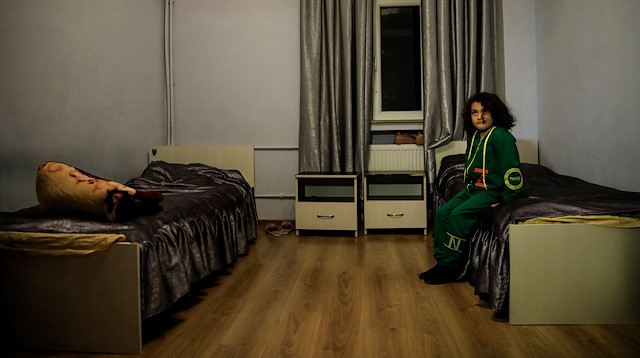
The residents of Ganja are taking shelter at the local state university's dormitory after Armenian army shelled the residential areas in the city.
In two missile attacks on Ganja, a major Azerbaijani city far from the front line, the Armenian army killed some two dozen civilians, including children, and injured scores more.
Amid the assaults, hundreds of Ganja residents were placed in the dormitory of Azerbaijan Agriculture State University for the past four days.
Speaking to Anadolu Agency, Ibrahim Caferov, the university head, said the dormitory was closed due to the novel coronavirus pandemic and that they began to host the Ganja victims shortly after the Oct. 17 assaults.
"35 families, consisting of 110 people, have been staying [in the dorm] for about four days. We are serving [the victims] three meals a day," Caferov said.
The university will do its best to continue hosting the victims, he said, adding: "Families can stay here for 2 more months with the current facilities available."
Leyla Ekberova, mother of two, said she was living with her family of 15 at their house shelled by Armenian missiles in their neighborhood in the Ganja city.
"Our house was severely damaged. [...] the officials told us that we should not stay there and that the house could collapse at any moment," Ekberova told Anadolu Agency.
Since fresh clashes erupted on Sept. 27, Armenia has continued its attacks on civilians and Azerbaijani forces, even violating humanitarian cease-fire agreements.
Since Oct. 10, Armenia has violated two humanitarian cease-fires in Upper Karabakh, or Nagorno-Karabakh, an internationally recognized territory of Azerbaijan. A new humanitarian cease-fire entered into force on Saturday.
Relations between the two former Soviet republics have been tense since 1991, when the Armenian military occupied Upper Karabakh.
Four UN Security Council resolutions and two from the UN General Assembly, as well as international organizations, demand the “immediate complete and unconditional withdrawal of the occupying forces” from occupied Azerbaijani territory.
In total, about 20% of Azerbaijan's territory – including Nagorno-Karabakh and seven adjacent regions – has been under illegal Armenian occupation for nearly three decades.
The Organization for Security and Co-operation in Europe (OSCE) Minsk Group – co-chaired by France, Russia, and the US – was formed in 1992 to find a peaceful solution to the conflict, but to no avail. A cease-fire, however, was agreed to in 1994.
World powers, including Russia, France, and the US, have called for a sustainable cease-fire. Turkey, meanwhile, has supported Baku's right to self-defense and demanded the withdrawal of Armenia's occupying forces.














